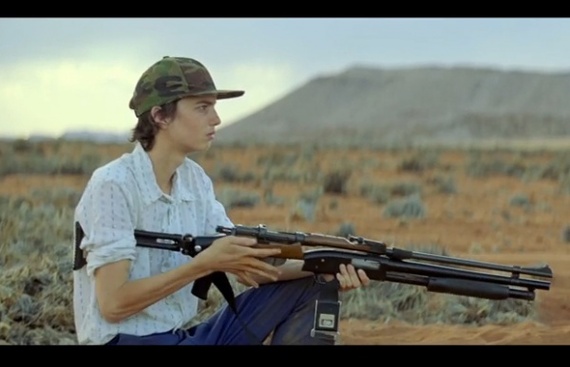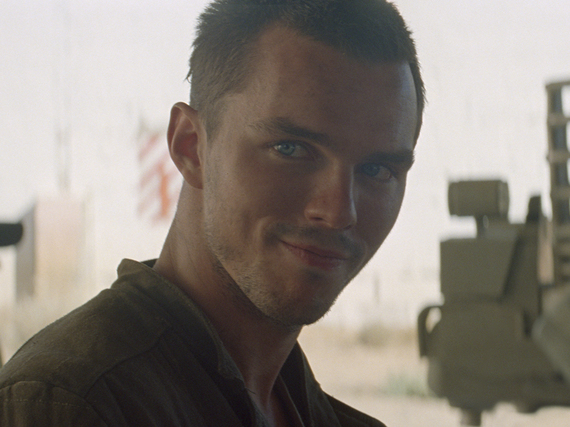When I was a kid, it always frustrated me to read a movie critic's best-of-the-year list to find it full of movies I'd never heard of, usually foreign films or small independent ones that weren't advertised on TV and didn't make it to the multiplexes in the suburbs where I lived. "Surely if these movies were that great, I would've at least heard of them," I thought, assuming that critics were including these lesser-known films so people would think they were too cool for more mainstream fare, regardless of its quality.
As I got older, I realized that sometimes the best movies (and I'm not even including documentaries) simply don't have the star power, mass appeal, or marketing muscle to break into the public's consciousness. And with time, I grew to relish stumbling upon one of these hidden gems that could have been so easily missed. It makes you feel both lucky to have found it and grateful that filmmakers devote so much to making something so idiosyncratic and special that it actually reduces the film's chances of a wider audience. Being surprised by an unknown movie you absolutely love is one of life's great, simple, rare treats, with all the thrill of knowing a big secret but with the fun of having a guilt-free license to blab about it.
I guess I'm saying that now I understand those list-making lovers of obscure films, and to prove it, I'd like to express my affection for Young Ones, a film written and directed by Jake Paltrow that you almost certainly haven't heard of but definitely shouldn't miss. Set in a not-too-distant future where hearts, minds, and politics have been hardened by years of brutal drought, Young Ones goes way beyond the sci-fi Western categorization it's been given to address timeless themes like family, economic struggle, regret, revenge, and adulthood. Watch my review of Young Ones below.
I had the chance to meet Jake Paltrow, and we talked about the film and how frustrating it is to feel like critics are missing the point.
On why the film is entitled Young Ones and Paltrow's thoughts on the resiliency of youth:
Jake Paltrow: It feels like, and now as a father, I see that kids are sort of built to survive. I remember Roman Polanski talking a bit about, as a boy in the ghetto, how the kids didn't know anything else, so they just created a life from what was available. There's a naturally heroic thing in that even when you don't intend it, and especially if it's not something you're choosing. So I was sort of reflecting on his point of view about his own youth, and I think that idea really drove the S.E. Hinton books, which were the first things that got me really excited about writing a movie like this when I reread Rumble Fish and The Outsiders. And the way she treated kids, told their stories, and the way the kids could sort of survive in those stories felt like something we hadn't seen in a while.
On how the production came up with the design of the "dooley" rifle/shotgun:
JP: That's one of those things that feels like a practical evolution of home defense down the road a bit, a long-range and short-range gun built into one thing. But I just liked it as a way to develop these small things within the film that let you know that it's not contemporary, it's not the way things are in life now, they're a little bit different. I just thought it would have an emotional quality where you'd never have to point at it or say anything about it but the audience would just look at it, know what it is, and maybe think it's cool.
On why Paltrow cast Nicholas Hoult (who plays Flem Lever, one of the film's three main characters):
JP: I loved him in Tom Ford's movie A Single Man, and you meet him in that and you're not sure who the kid is, and even as the film unfolds you're wondering, "Is he a hustler? Or is he an angel?" And Nick has such a natural warmth that I had a hunch he could be this enigmatic force in the movie, but at the same time make the character of Flem much more complex, and that's exactly what happened. He elevated that character quite a bit in terms of complexity from the way it was written in the screenplay.
On why critics who call Young Ones "dystopian post-apocalyptic sci-fi" are missing the point:
JP: To me the world isn't apocalyptic at all, especially in what that means to people now where there are so many of these movies where the post-apocalyptic thing always seems to take on a supernatural quality, like a nuclear holocaust or an unnamed event, where something has happened and we're not going to talk about it but here's the world because of it. I think for this movie what we're really dealing with is an extrapolation of an environmental and political landscape we're living through right now in California, and this sort of ratchets it up to an extreme, but not an extreme that's sitting on something fictional.
Jonathan Kim: It's not even extreme!
JP: Of course! The water agreements between all these western states are really complicated and really weird and they've been changed through the years starting in the 1920s, and there's a potential conflict in place. I think in the 1930s the governor of Arizona sent the National Guard troops he had in his state to this dam that was being built out of fear that too much water was being siphoned off and sent in the wrong direction. There's a history of this almost armed conflict over water issues, especially between Arizona and California. And in the late 60s Arizona made a concession to Phoenix and Tucson that, in case of a catastrophe, they would put themselves last on the list for water, and we're almost there. We're at this point now where, in this agreement, those cities would lose 50% of their water before California would lose a drop. And the fictional aspect of the film is that if you end up with some ambitious, despotic governor who says he wants to shore up the water reserves and no more water is coming to California, our movie shows the reaction by the federal government which is to treat that offending state like Zimbabwe and sort of freeze it out completely, and these are the people left behind. So this isn't happening everywhere, this is happening in sort of a fictional version of Colorado meets Arizona, mixing the political landscape and topography, but these are all things that aren't so off base.

